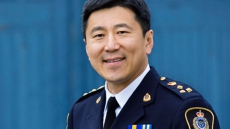VANCOUVER - Policing costs and the number of officers continue to rise in some Canadian cities despite a decline in crime rates, according to a new study by the Fraser Institute.
The report, released by the conservative-leaning policy think tank on Monday, said between 2001 and 2012, police officers per 100,000 Canadians rose 8.7 per cent while crime rates during the same period fell by 26.3 per cent.
The study, Police and Crime Rates in Canada, also said the cost of policing went up by 45.5 per cent between 1986 and 2012, while the number of Criminal Code incidents handled by each officer went down by 36.8 per cent.
Using data from Statistics Canada for the census years 2001, 2006 and 2011, and controlling for local crime rates, demographics and other socio-economic differences, study author Livio Di Matteo said his calculations suggest some areas have more officers than warranted, while others have fewer than needed.
"That results in understaffing and overstaffing," he said in an interview. "That's one way of interpreting the numbers."
Di Matteo, an economics professor at Lakehead University in Thunder Bay, Ont., used a statistical model to predict the number of police officers per 100,000 Canadians. He then compared that figure to the actual number of officers.
Saint John, N.B., Winnipeg, Man., and Windsor, Ont., are cited in the study as having the least efficient staffing levels, while Moncton, N.B., Kelowna, B.C., and Ottawa-Gatineau are cited as having the most efficient staffing levels.
According to his calculations, Windsor, Ont., is predicted to have 138 officers per 100,000 people, and it actually has 181, Di Matteo said.
"When you get a number like that, it doesn't necessarily mean 138 is optimum because these numbers are calculated based on a model that uses national data," he said.
"So the next question you should ask yourself is, if your numbers diverge that much from the optimum, might there be any extenuating circumstances?"
Windsor Police Service said Di Matteo's findings do not reflect its experience, as there has been a six per cent-reduction in police officers per 100,000 over the past three years.
"In 2011 the Windsor Police Service reported sworn officer strength of 466 to Statistics Canada," said a written statement released by the Office of the Chief of Police. "Today, September 2014, the Windsor Police actual sworn strength is 440. The reduction over the three year period is a total of 26 sworn officers."
The statement also notes that downtown Windsor is home to a casino that brings in thousands of daily visitors, and the city's proximity to the state of Michigan, where the legal drinking age is 21 — compared to Ontario's 19 — requires a large police presence.
Di Matteo agrees that the Statistics Canada data do not account for unique circumstances that could influence policing levels in each census metropolitan area.
"Some communities, for example, may have more issues with gangs than others, but there's no way of knowing that from the aggregate data," he said. "Some communities might have different policing styles, and some (census metropolitan areas) are quite large geographically and it could be they have several police forces."
While the decline in crime rates could be attributed to more resources being devoted to fighting crime, Di Matteo suggested that may not necessarily be the case. Current police resources are at the same level as they were in the early 1990s, even though crime rates have declined since 1991, he said.
"This suggests that the long-term relationship between police resources and crime rates is not necessarily an inverse one," Di Matteo said in his report.
The study also notes that while higher crime rates may require more police spending, some cities have much smaller police forces than their crime rates would predict.
Di Matteo said the nature of policing work has changed over the years to include responding to social problems and behaviours. The increased reliance on technology during investigations also means police are dealing with larger volumes of emails, phone calls and text messages.
Both instances raise the question of whether police resources are being used efficiently, he said.
"Police will often say that they're being called upon to do many other things, almost a function of social workers. It's probably important to start collecting the data if that is really what's driving the demand."




